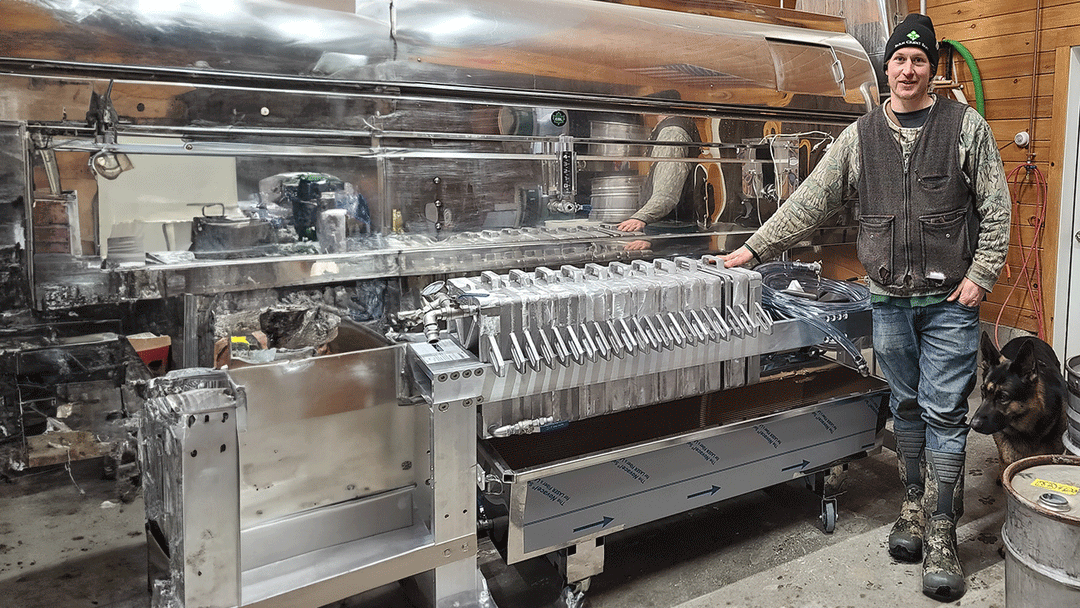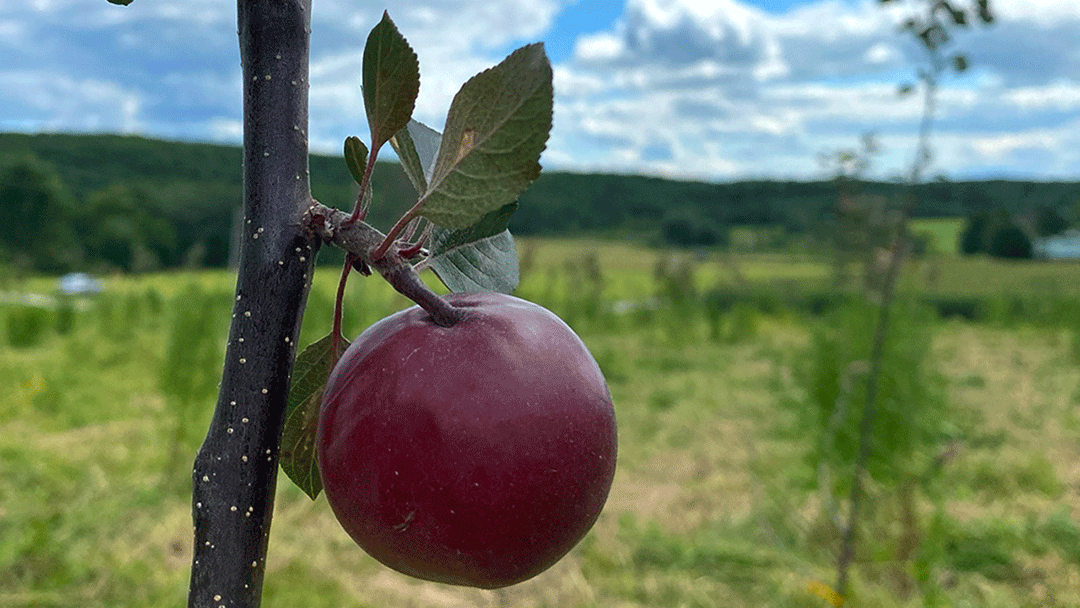Is Maple Syrup Good for You?

Maple syrup has long been considered a healthier alternative to industrially processed sweeteners such as refined sugars. Not only does it contain essential minerals like calcium, phosphorus, and antioxidants which help to protect tooth enamel, but it also has a lower glycemic index than most other sweeteners, making it an excellent choice for those looking to maintain a healthy diet.
Although maple syrup is a popular natural sweetener, it can still be harmful if consumed in excessive amounts due to its high sugar content. Moderation of all sweets is highly recommended by not only us at the farm but likely your doctor as well! Always check with your doctor about your personal situation related to health and diet
Alongside this potential risk of too much white sugar, maple syrup also has many benefits as an alternative sweetener. From its antioxidant content to the range of minerals like calcium and phosphorus, these properties make it an excellent choice for those seeking a healthier alternative to processed sugars. In addition, studies compare the nutritional value of maple syrup with other sweeteners such as honey over refined sugars, and the results show more positive outcomes for maple syrup than many would expect.
When comparing maple syrup to other sweeteners, you’ll find that it stands out as providing more nutrients for less sugar intake overall. In this blog we will explore the potential health benefits and risks associated with consuming maple syrup, to help you make an informed decision about your sweetener of choice. So let’s take a closer look!
Why choose maple syrup?
In addition to health benefits, there are many driving forces why people choose one product over another. Maple syrup is a high-quality product that comes from the sap of maple trees. It has been used as a natural sweetener for centuries and is getting more popular by the day. Maple syrup provides a distinct flavor to foods without adding refined sugars or artificial flavor additives. Unlike other traditional sweeteners, such as white sugar, it is vegan-friendly, making it an ideal choice for individuals with dietary restrictions or allergies. Additionally, maple syrup is gluten-free, further expanding its inclusive dietary envelope.
Sustainable Harvest Practices
Maple syrup is widely regarded as one of the most sustainable sweeteners available. When compared to refined sweeteners such as white sugar and high fructose corn syrup, maple syrup has many advantages. For example, it can be harvested responsibly and sustainably with minimal impact on the environment. Refined sweeteners, on the other hand, are typically processed using chemically derived ingredients and have been linked to deforestation due to their large-scale production methods. At the risk of stating the obvious, the forests of maple trees from which sap is harvested have the benefit of contributing to one of the earth's greatest carbon sinks, forests themselves.
Every 5-10 years sugarcane crops must be replanted, and these are best-case numbers depending on the level of farm management skill. Maple trees are perennial crops, often living for over 200 years and if managed properly can continue to produce high-quality syrup far longer than we'll ever hope to live. So, while sugarcane is a perennial crop, it still must be replanted with far greater frequency than its maple counterparts.
No added fertilization or pesticide use is required with maple tree growth - a bonus in terms of sustainability. Sugar cane, on the other hand, often requires these interventions to produce relevant amounts of stalk growth and as a result, can lead to pollution of nearby waterways due to fertilizer and pesticide runoff. Through proper caretaking, maple syrup producers' sustainable tapping techniques can ensure that the life expectancy of maple trees will outlive the generation taking care of them - making this sweetener both a delicious and environmentally friendly choice for those looking for healthier alternatives.
At Carman Brook Farm, we source our Vermont maple syrup from our forest of maple trees and process it minimally so that the product remains pure and unblended. This ensures that you are getting the best quality syrup available – one that retains its natural flavor without any added preservatives or chemicals.
Our process also allows us to keep track of where each bottle originates so you can feel good knowing exactly what you're receiving when you purchase one of our products. By opting for maple syrup instead of other sweeteners, you can enjoy great-tasting food while avoiding processed sugars, artificial ingredients, and animal byproducts.

Health Benefits of Maple Syrup
But wait, there's more! Maple syrup provides more health benefits than traditional refined sugars. It is a natural sweetener that contains essential minerals such as zinc, potassium, manganese, and calcium. These minerals help boost metabolism and can help regulate blood sugar levels. Maple syrup also contains antioxidants that help protect the body from damage caused by free radicals (I'll explain that a little later on).
The powerful antioxidants maple syrup contains are called polyphenolics, which have been linked in studies to possess anti-inflammatory properties. These polyphenols, specifically proanthocyanidins and gallic acid, have been found to play a role in the prevention of various types of cancer. Maple syrup also contains other antioxidant compounds, including flavonoids, phenolic acids, anthocyanins, and lignans. All of these antioxidants work together to help reduce inflammation and promote overall health.
What are antioxidants?
Antioxidants are molecules, often found in certain foods, that help protect the body from damage caused by harmful molecules called free radicals. Antioxidants work to neutralize free radicals and therefore improve overall health. The scientific community widely recognizes the benefits of antioxidants for improving health and many studies have been conducted to assess their effectiveness. While more research still needs to be done, it is generally accepted that antioxidants can play an important role in reducing inflammation and promoting a healthier lifestyle.
If you were wondering what free radicals are, so was I, so I did a bit of research. Free radicals are molecules with an unpaired electron. They are highly reactive, and unstable, and can damage cell membranes, proteins, and DNA when their numbers get too high. Free radicals can be produced from pollutants, chemicals, radiation, and even natural processes such as metabolism. The body's natural defense system works to neutralize free radicals through antioxidants which act as a shield against their potentially damaging effects.

Nutritional Value of Maple Syrup
Maple syrup is an excellent source of essential minerals, providing significant amounts of manganese, zinc, calcium, and potassium. It also contains trace amounts of magnesium and B vitamins. Maple syrup has a lower glycemic index (54) than other common sweeteners like sugar (65) or corn syrup, meaning that it can be used without causing a dramatic spike in blood sugar levels. This makes it a great choice for those looking to keep their sugar intake under control while still enjoying the flavor of maple syrup in their cooking and baking.
The glycemic index is a system used to measure the impact of different foods on blood sugar levels. Foods are rated on a scale of 1 to 100 based on their effect on the body's blood sugar level when they are consumed. Foods with a high Glycemic Index (GI) such as white bread, pretzels, and cornflakes cause rapid increases in blood sugar levels; while low GI foods, such as some fruits and vegetables, have less of an impact. Foods with a medium GI rating like maple syrup provide a balance between sugary sweetness without causing a drastic spike in your blood sugar.
So what's in maple syrup?
-
Sugar: Maple syrup primarily consists of sugar and water. The sugar content ranges by Vermont regulation, from 66.9% to 68.9%, with sucrose comprising approximately 96% of the sugars. Glucose makes up about 2-3%, while fructose accounts for the remaining 1-2%. This composition contributes to maple syrup's characteristic sweetness and texture and these numbers vary during the season.
-
Water: The remaining portion of maple syrup, approximately 31.1% to 33.1%, is water.
Sugar and water is a very simple answer, but there's more to it than that, real maple syrup has a host of minerals, antioxidants, amino acids, and other phenolic compounds which include the following.
-
Minerals:
- Calcium: Maple syrup contains significant amounts of calcium, which plays a crucial role in bone health, muscle function, and nerve transmission.
- Potassium: Potassium is an essential mineral for regulating blood pressure, fluid balance, and muscle contractions. Maple syrup is a good source of potassium.
- Magnesium: Maple syrup provides magnesium, which is involved in enzymatic reactions in the body, including energy production, protein synthesis, and muscle function.
-
Trace Minerals:
- Zinc: Maple syrup contains trace amounts of zinc, an essential mineral involved in immune function, wound healing, and DNA synthesis.
- Phosphorus: Phosphorus is found in small quantities in maple syrup and is important for bone health, cell membrane structure, and energy metabolism.
- Manganese: Manganese is a trace mineral present in maple syrup that acts as a cofactor for several enzymes involved in metabolism, bone formation, and antioxidant defense.
- Sodium: Maple syrup contains trace amounts of sodium, which is necessary for maintaining fluid balance, nerve function, and muscle contractions.
- Iron: Iron is found in maple syrup in small amounts and is important for oxygen transport, energy metabolism, and immune function.
-
Antioxidants:
- Maple syrup contains various antioxidants, including phenolic compounds, which help to neutralize harmful free radicals and protect cells from oxidative damage. These antioxidants contribute to maple syrup's potential health benefits, such as reducing inflammation and supporting overall well-being.
-
Amino Acids:
- Maple syrup contains high levels of amino acids, which are the building blocks of proteins. These amino acids also contribute to the Maillard reaction, a chemical reaction that occurs during the heating and caramelization of sugars in maple syrup, resulting in its characteristic flavor and color. The levels of amino acids vary in different grades of maple syrup, with darker syrups typically containing higher levels, you can real all about that in my blog on the grades of maple syrup.
Nutrition Facts
Serving Size: 1/4 Cup or 60ml
- Calories: 200-220kcal
- Carbohydrates: 53-54g
- Calcium: 60mg
- Magnesium: 28mg
- Potassium: 90mg
- Sodium: 220mg
- Manganese: 1.8mg
Is Maple Syrup Healthy?
While all sugar should be consumed in moderation, substituting unrefined sugars like maple syrup for processed sugars can be a healthier alternative. It contains some essential minerals, including calcium and potassium, as well as trace amounts of magnesium and B vitamins. However, it should still be consumed with care due to its relatively high sugar content.
Maple syrup also has fewer calories per serving than most sweeteners, making it an ideal choice for those watching their weight. Ultimately, while maple syrup can be a nutritious addition to a healthy diet, any type of added sugar should be consumed in moderation to avoid potential health risks associated with excessive consumption.
How Does Maple Syrup Compare to Other Sweeteners?
In comparison to refined sugars and as I've already mentioned, real maple syrup does not raise blood glucose levels as quickly, meaning that it is better for those trying to manage their diabetes or other conditions related to blood sugar levels. Similarly, the aforementioned fewer calories per serving than traditional refined sugars and carries fewer risks of weight gain.
Compared to refined sugars, maple syrup is considered a better choice for your teeth because it contains important minerals like calcium and phosphorus that help protect your tooth enamel from the damaging effects of sugar. Additionally, maple syrup’s natural sweetness means it only needs small amounts to sweeten recipes and drinks, making it easier to maintain a healthy level of consumption.
Also important, maple syrup does not create the same sticky residue that refined sugars can leave on your teeth when eaten in large amounts. All these factors make it an excellent alternative sweetener compared to traditional, processed options.
Maple Syrup Vs. Honey
When deciding to use honey or maple syrup, it's important to recognize that each offers different flavor profiles. Honey has a more prominent floral flavor while maple syrup provides a deep, complex sweetness that varies between the grades of maple syrup. Nutritionally, honey is higher in natural sugars than maple syrup and contains fewer empty calories than other sweeteners such as regular sugar or corn syrup. Because of its antioxidant content, honey is ideal for those wanting to boost their immune system or fight disease. Maple syrup on the other hand is higher in minerals such as calcium and iron. Maple syrup also edges out honey in calories, with a serving of maple syrup having 220 compared to 258 for honey. When choosing which sweetener to use in recipes, consider the flavor and nutritional profile of both honey and maple syrup which can make all the difference! I'll talk more about that in the next section.

Honey and Maple Syrup Uses
Honey and maple syrup can both be used as sweeteners in cooking and baking. Honey has the advantage of not needing to have any additional ingredients added to it such as butter or cream. It also has a naturally syrupy texture which makes it ideal for glazes, sauces, and marinades. Additionally, because of its natural antimicrobial properties, honey is also a great ingredient for making preserves and jams. By contrast, maple syrup has a much bolder flavor profile (this varies depending on which grade you have, either light or dark syrup) which makes it better suited for desserts or as an addition to drinks such as coffee or tea. It's also high in sugar content so when baking with syrup, less sugar is needed compared to other sweeteners like sugar cane or corn syrup. Though you do need to adjust your liquid content a bit.

Refined Sugars
Refined sugar is a type of sweetener made from processed, granulated cane or beet sugar that has been stripped of its natural molasses content. Refined sugars are thought to be more harmful to health than some other forms of sugar due to their higher levels of calories and lack of essential minerals and vitamins. Refined sugars are typically found in a variety of processed foods such as candy, baked goods, and sugary beverages.
The process of refining sugar usually involves washing and filtering the raw materials to remove any impurities and contaminants. After the sugar is washed, it is then heated up and spun rapidly in a centrifuge, allowing the molasses to separate from the sugar crystals. Following this step, the sugar is further washed and dried before being bleached to achieve its white color. Lastly, it is ground into granules ready for distribution.

The word "bleached" raised my eyebrows, so I looked into it a bit further for some clarity. Refined sugar is bleached using chemicals such as sulfur dioxide, bone char, or activated carbon, which help to lighten its color. The treatment process also helps remove any remaining impurities from the sugar crystals and make them more uniform. The resulting product is a white-colored crystal form of sucrose, which is the type of refined sugar most commonly used for cooking and baking.
Bone char is sometimes used in the refining process of sugar, but it is not considered vegan-friendly. The bone char used to refine sugar is a byproduct of the cattle industry and typically comes from cattle that were raised for meat production. As such, refined sugar that uses bone char as part of its refining process can't be considered vegan-friendly.
In Conclusion
I'd like to close with this, maple syrup is an incredibly versatile and nutritious natural sweetener that provides a range of benefits over traditional and refined sugars. The essential minerals like calcium, phosphorus, and antioxidants it contains help protect tooth enamel while its low glycemic index makes it great for maintaining a healthy diet. Additionally, multiple studies have compared the nutritional value of maple syrup to that of other natural sweeteners such as honey over white sugars, revealing more positive outcomes for maple syrup than expected. This makes it a great choice for those looking for a healthier alternative to industrially processed sweeteners without sacrificing taste or texture. All these factors make it easy to understand why so many people are turning to maple syrup for their sugar needs! Always check with your doctor about your personal situation related to health and diet.








Does nrooks mapel syrup contain sulfur
Leave a comment